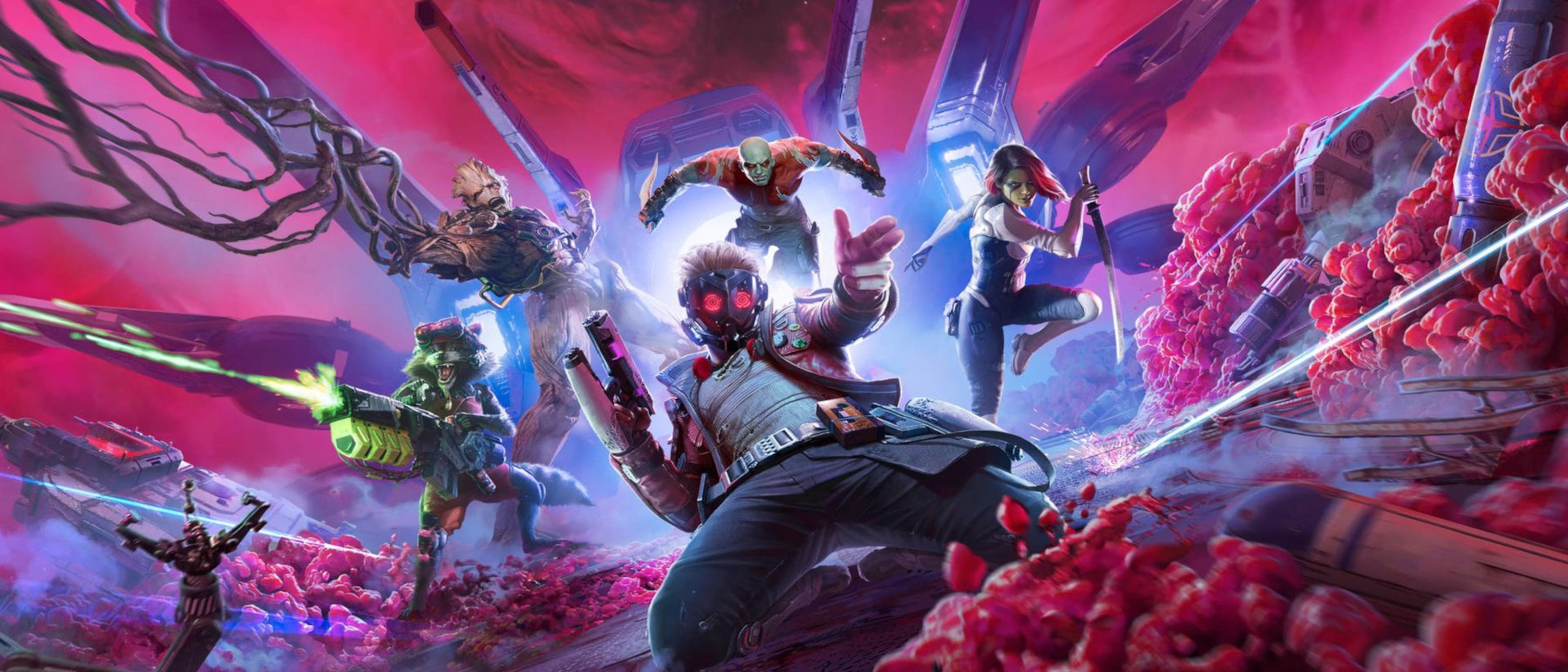Tom's Guide Verdict
Marvel’s Guardians of the Galaxy delivers a hard-rocking space adventure filled with thrilling action, captivating alien worlds and memorable characters.
Pros
- +
Varied gameplay
- +
Relatable and sympathetic characters
- +
Awe-inspiring alien worlds
- +
Hard rocking soundtrack
Cons
- -
Persistent hidden load screens
Why you can trust Tom's Guide
Platforms: PC (reviewed), PS4, PS5, Xbox One, Xbox Series X/S, Nintendo Switch
Price: $60
Release Date: October 26, 2021
Genre: Action/adventure
Marvel’s Guardians of the Galaxy is a Marvel Cinematic Universe film in video game form. It has all of the humor, action, and memorable music that made the franchise a hit. You could argue it’s just as good or better than its source material due to it being interactive. Guardians of the Galaxy’s stylized graphics, exceptional voice acting and rocking soundtrack make it among the most enjoyable titles of 2021.
In many respects, Guardians of the Galaxy is a “pure” action adventure experience. Eschewing modern AAA game trends, it's a surprisingly stripped down and focused affair. There are no side quests or skill trees, nor is there leveling up or inventory management. This aspect might displease players seeking endless hours of playtime, but it’s refreshing to see a high-profile game jettison extraneous content in favor of delivering a straightforward adventure.
- Marvel's Avengers: Lackluster gameplay undermines an ambitious story
- Read how we would love to see another Eidos-developed Guardians of the Galaxy and other such franchise games
- Plus: Guardians of the Galaxy is nothing like Avengers — and that’s why I love it
Marvel's Guardians of the Galaxy review: Story
The game starts with the Guardians of the Galaxy entering an ancient starship graveyard to retrieve a “deadly” creature for a warlord named Lady Hellbender. At this point in the Guardians’ career, Peter Quill (Star-Lord) tries to keep the newly-formed band of misfits together. Drax distrusts Gamora, Gamora remains distant and Rocket and Groot seem to only care about their own interests. The team succeeds in their mission only to find themselves arrested by the Nova Corps who police the spaceways. This, in turn, drops the Guardians in the middle of a struggle that could engulf the entire universe.
The story delivers all of the requisite twists and action sequences expected from the genre and a Marvel Cinematic Universe film. It’s an engaging tale on its own, but it's the Guardians and their respective internal struggles that lend the story both heft and heart. As the tale progresses, you’ll gain insight into each Guardian. Seemingly comedic characters like the foul-mouthed Rocket or too-literal Drax hide tumultuous and painful pasts. Overcoming trauma is the core theme of Guardians of the Galaxy and one that will resonate with audiences who’ve had to or continue to deal with life’s tribulations.
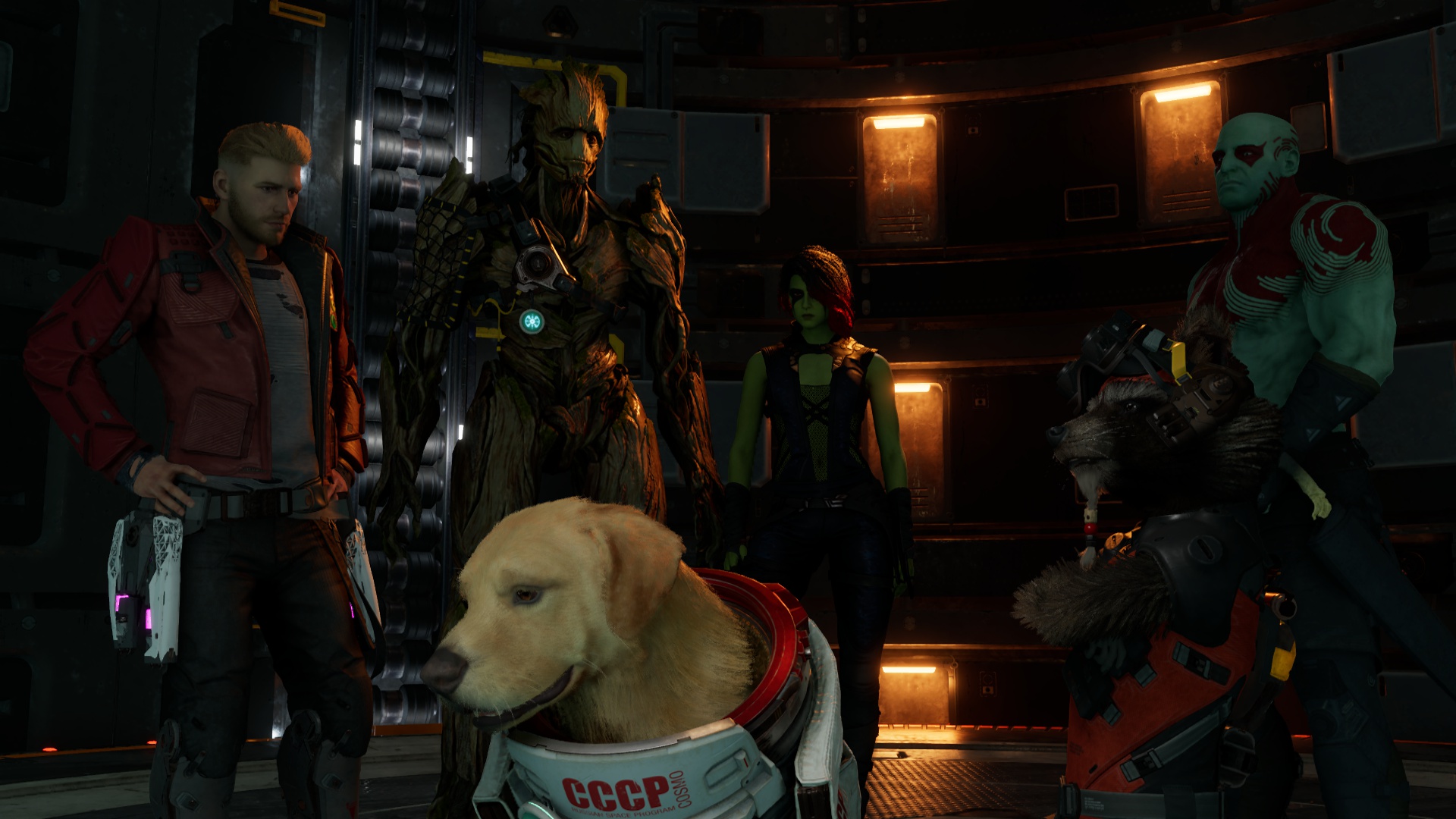
Characters don’t just interact during cutscenes. They converse and bicker with one another all along the adventure. You’ll often get dialogue options to respond to characters’ conversations. Agreeing with Rocket when he wants to destroy something or telling Drax to calm down doesn’t impact the larger narrative, but these instances can open up additional dialogue options later on.
There are certain events that alter the narrative, though only slightly. For example, speaking into a pilfered Nova Corp helmet will result in a battle, while doing the opposite avoids the encounter. Some non-playable characters may lend their aid if you side with them, making certain battles easier or giving you access to sealed-off rooms. But no matter what choices you make, the main narrative remains unchanged. Still, the choices, as superficial as they may seem, are appreciated.
Marvel's Guardians of the Galaxy review: Gameplay
Guardians of the Galaxy feels like a narrative-driven third-person action/adventure game released in the late 2000s or early 2010s. There is a balanced mix of combat, platforming and mild puzzle-solving. Aside from prolonged combat encounters during the third act, you’re never doing a single activity for very long. This keeps the game moving at a steady pace since it’s always engaging you with different objectives.
Blasters are your primary weapons, though you can engage in melee combat to deal with enemies that get too close. Dodging and jumping over attacks is another part of your repertoire. As the game progresses, the blasters gain elemental effects that work well against specific enemy types. Some foes are weak to ice and fire blasts while others cannot handle electric of earth attacks. You can swap between element types at any moment, which you’ll need to do when the game tosses enemies with various weaknesses against you. Shattering frozen opponents afflicted by ice blasts or locking multiple foes in place with a chain lightning attack is not only enjoyable but strategically sound. Though you only have direct control over Star-Lord, his numerous and ever-evolving abilities prevent combat from becoming stale and repetitious.
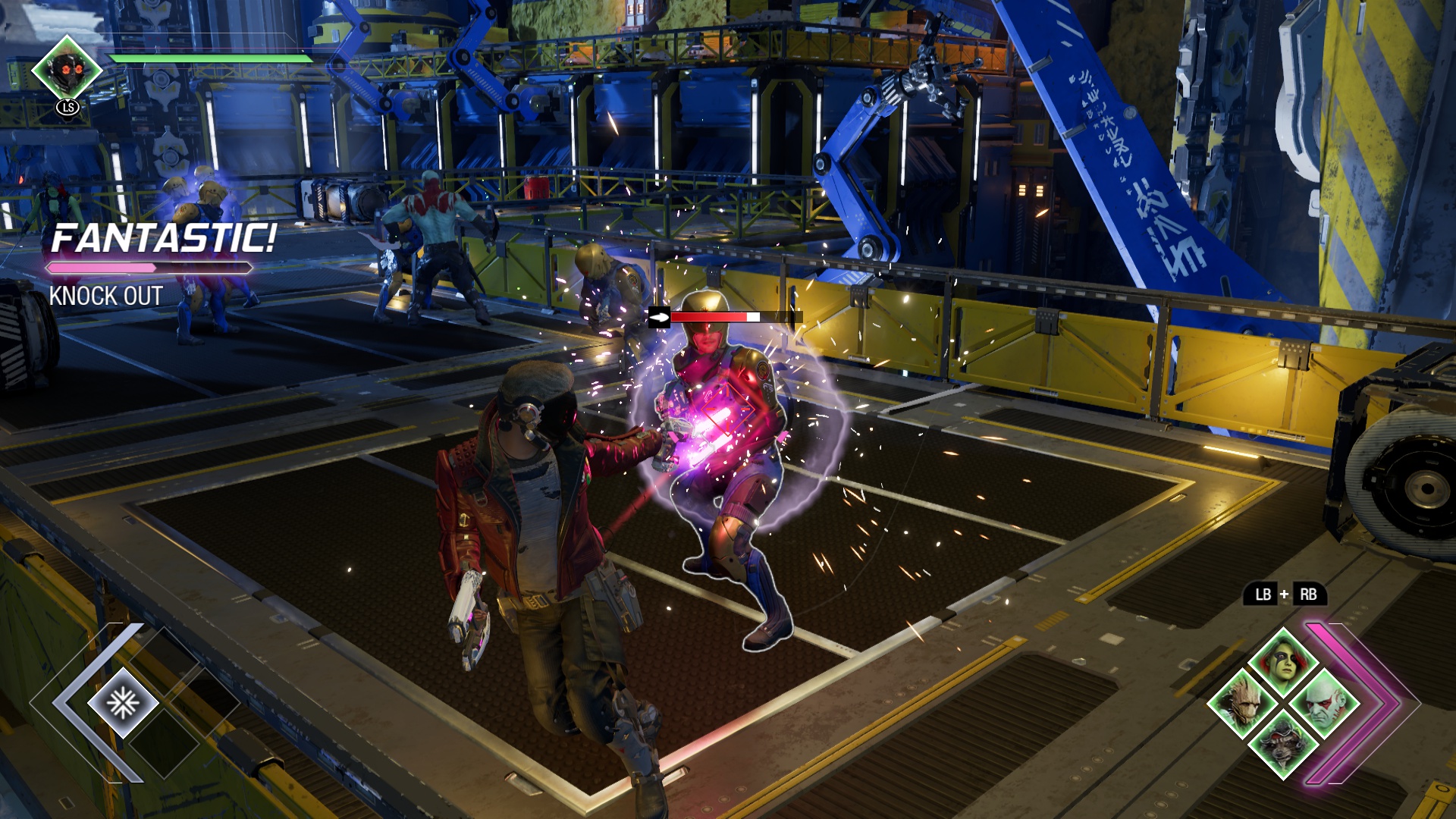
You cannot assume control of your teammates but you can have them perform different attacks and abilities. Gamora and Drax’s abilities are best suited against single opponents, while Rocket and Groot are ideal for handling large groups. There is a minor cooldown period every time you use one of the Guardians’ abilities. Getting into the habit of using your mates’ powers is crucial, especially during the latter half of the game. But once you’ve mastered Star-Lord and the Guardians’ unique skills, you’ll make short work of anyone and anything you come across.
One of the most enjoyable mechanics is the team huddle. A meter located on the right-hand side of the screen fills during battle. When it tops off, you can call your team to huddle up. Words and sentences, along with lines delivered by the Guardians, provide a glimpse into their mental state. The team may be overconfident or feel hopeless. You’ll have to select one of two speech options to either cool the Guardians down or inspire them to persevere. A correct choice gives the entire team an attack boost. Conversely, a wrong choice results in only Star-Lord gaining added offense. Team huddles are not only beneficial when you’re on the proverbial ropes but they make you feel as if you and the others are a tight-knit squad.
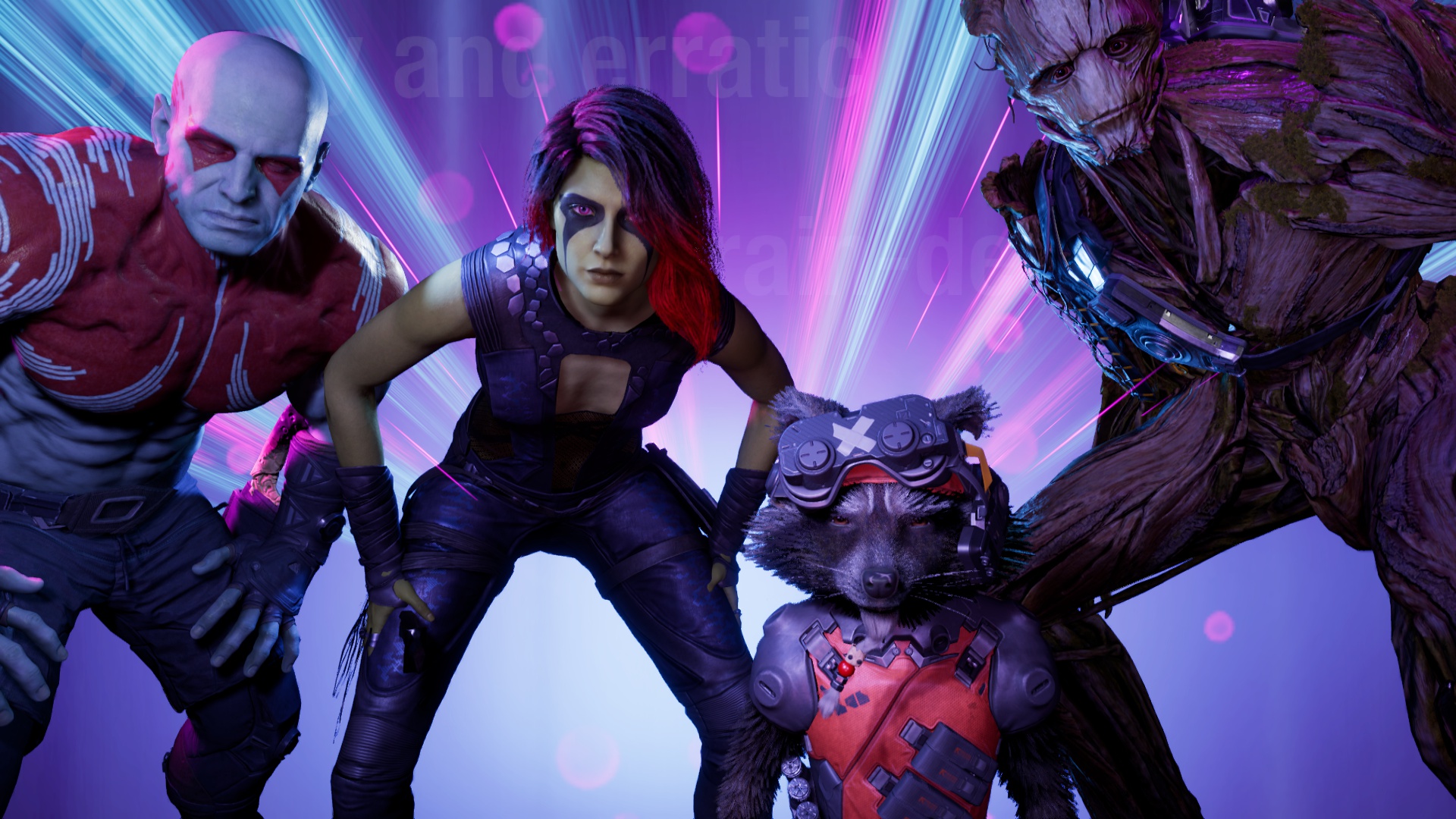
When not shooting up alien baddies, you’ll engage in mild puzzle-solving and platforming. There is no shortage of expansive gaps to surmount or security systems to bypass. Star-Lord’s jet boots help you jump over small gaps or reach high ledges with minimal effort. Platforming doesn’t feel as intuitive or effortless as it does in games like Uncharted or Tomb Raider, but the mechanic works well enough.
Peter’s scanner displays interactive portions of the environment. This mechanic is most useful for solving puzzles, but it can also display enemy weaknesses. Some locked doors need power to open. Unlocking these doors usually requires you to reroute power to them. The only way to do that is to use your visor to see where the power lines lead so you can redirect and change their course. You won’t find many of these specific types of puzzles. Most have you ordering specific Guardians to break walls (Drax), slice power cables (Gamora), create vine bridges (Groot) or crawl through air vents (Rocket). The puzzles are simplistic, but they space out battles and give something different to focus on.
Guardians of the Galaxy contains mild role-playing game (RPG) elements. Unlike other action-heavy franchises such as Assassin’s Creed, Guardians’ RPG elements are complementary and have no detrimental effect if you choose to ignore them. This can be a negative for those who seek deeper role-playing mechanics, but a positive for people who simply want to enjoy the adventure.
You’ll discover hidden and not-so-hidden components strewn across each level that you can give to Rocket, who will create mods at workbenches. There is a workbench on the Guardians’ starship, but each level also has one. Abilities and bonuses include enhanced shields, faster cooldowns, additional health and more. You’re free to completely dismiss this aspect of the game but it’s there for those who enjoy crafting.
Skill points earned in battle can then be used to unlock new abilities for the Guardians. Each Guardian (yourself included) has four skills max (with the fourth being locked behind story progression). Though you can ignore this aspect, I advise against it. The game becomes quite challenging in the second half. As such, it’s good to have a wide range of abilities and powers at your disposal.
Marvel's Guardians of the Galaxy review: Hidden load screens
Hidden load screens are nothing new in gaming. We’ve all played games which require you to crawl through wall cracks, walk across empty halls, slide down steep cliffs or take long elevator rides. Guardians of the Galaxy has all of these instances and more. I’m not sure if Guardians actually has more of these sequences than normal or if I’ve just become overly sensitive to them, but there are points when I felt bombarded by endless corridor and wall crawls. These hidden load screens prove that, no matter how gorgeous the game looks, it is decidedly a last-gen title. This doesn’t ruin the experience in any meaningful way, but it is the game's biggest flaw.
Marvel's Guardians of the Galaxy review: Visuals and sound
Guardians of the Galaxy is a visual stunner. The detailed graphics contain a stylized flair that gives the game a distinctive identity. The otherworldly environments and set pieces brim with an array of fetching colors and captivating alien architecture. Visual effects like volumetric fog and ray tracing are both subtle and harsh where they need to be, making the planets you visit feel authentic and lived in. Whether it’s an abandoned Nova Corps station, the packed streets of Knowhere or Maklu-IV’s frozen wastes, there is no shortage of incredible locations
Characters receive the same attention to detail as the environments. While Peter Quill and his compatriots may not resemble their cinematic or comic book counterparts, they look great regardless. This is also true for the expansive array of friends and foes you meet along the journey. Every space slug, shady multi-armed merchant or elemental being looks fantastic.
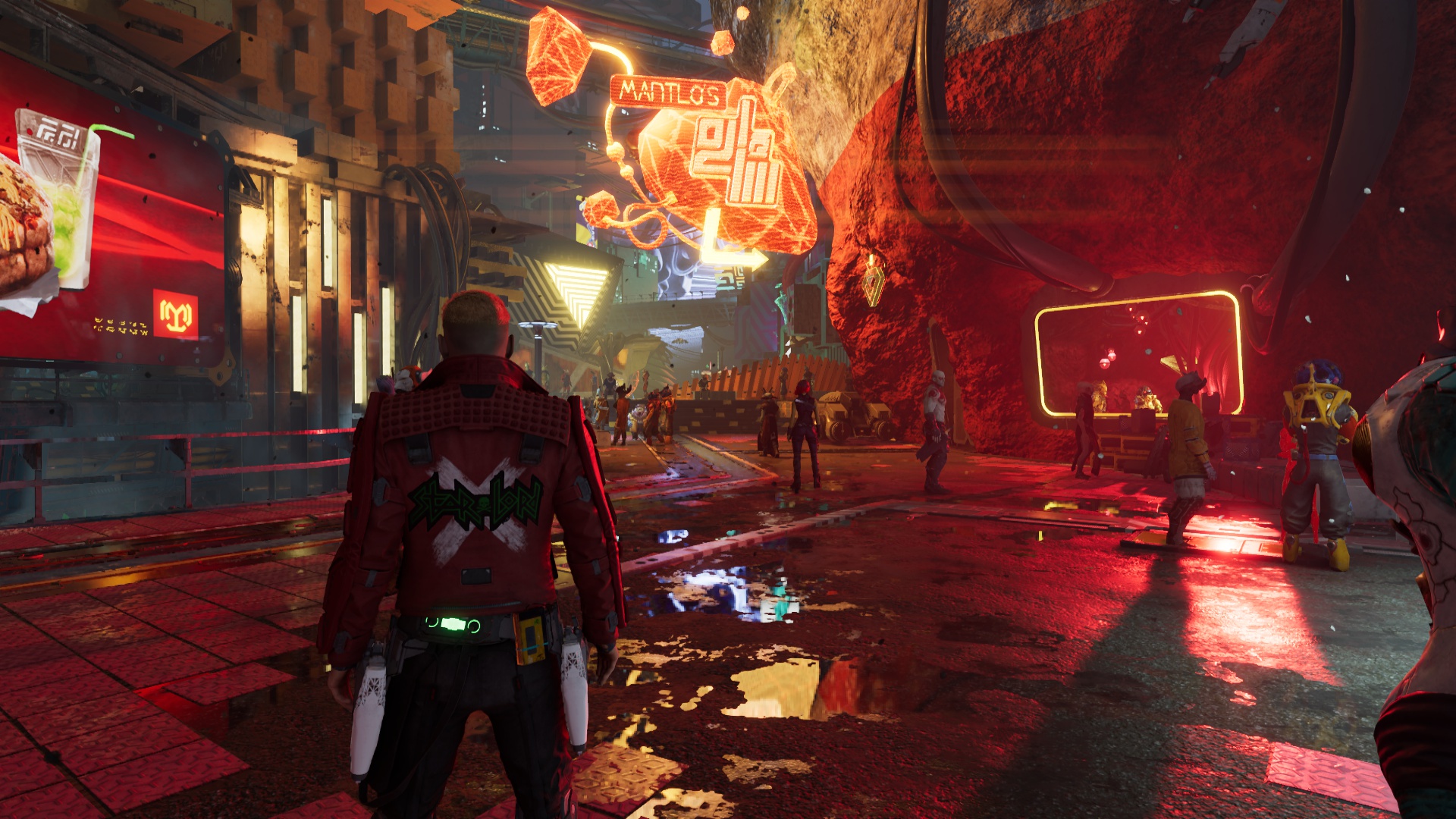
The game’s hard rock and heavy metal-packed soundtrack amplifies the experience. Hearing bands like Iron Maiden, Motley Crue and Kiss will get your blood pumping during over-the-top action sequences. The songs played after performing team huddles enliven conventional enemy encounters.
The fictional in-game “Star-Lord” band that inspired Peter Quill’s superhero moniker rocks just as hard as any of the classic acts on the soundtrack. The band’s catalog of songs contains everything from blistering rockers to soaring power ballads. Despite the musical variety, all of the songs’ lyrics share a similar thematic element. Tunes like “No Guts, No Glory” and “Ghost” center around underdogs rising to meet life’s challenges and overcoming their personal demons. That theme is the heart of what makes Guardians of the Galaxy resonate with audiences. The licensed music alone would have sufficed but the Star-Lord band makes it truly exceptional.
Marvel's Guardians of the Galaxy review: Verdict
Marvel’s Guardians of the Galaxy is one of the most enjoyable games of 2021. It is the definition of a crowd-pleaser due to its easy-to-master controls, lush alien environments, relatable characters, and hard-driving soundtrack. This may be unfair to say, but Guardians of the Galaxy is what we wanted from Marvel’s Avengers: A fun, focused single-player action/adventure game. Eidos-Montreal crafted something special with this game and we look forward to seeing where they take the franchise next.

Tony is a computing writer at Tom’s Guide covering laptops, tablets, Windows, and iOS. During his off-hours, Tony enjoys reading comic books, playing video games, reading speculative fiction novels, and spending too much time on X/Twitter. His non-nerdy pursuits involve attending Hard Rock/Heavy Metal concerts and going to NYC bars with friends and colleagues. His work has appeared in publications such as Laptop Mag, PC Mag, and various independent gaming sites.
